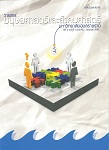การพัฒนากลยุทธ์ทางการตลาดผลิตภัณฑ์สมุนไพร ของกลุ่มวิสาหกิจชุมชน จังหวัดอุบลราชธานี
Main Article Content
บทคัดย่อ
การศึกษาวิจัยนี้มีวัตถุประสงค์ เพื่อศึกษาระบบตลาดและคาดคะเนระดับความต้องการผลิตภัณฑ์สมุนไพร ศึกษาพฤติกรรมการเลือกซื้อและปัจจัยที่มีอิทธิพลต่อการตัดสินใจซื้อผลิตภัณฑ์สมุนไพรของผู้บริโภคและนำเสนอกลยุทธ์ทางการตลาดผลิตภัณฑ์สมุนไพรของกลุ่มวิสาหกิจชุมชน จังหวัดอุบลราชธานี ประชากรที่ใช้ศึกษามี 2 กลุ่มคือ ผู้บริโภคที่ใช้ผลิตภัณฑ์สมุนไพร และผู้นำกลุ่มวิสาหกิจชุมชน สำรวจภาคสนามใช้แบบสอบถามและการสัมภาษณ์เชิงลึก วิเคราะห์ผลโดยใช้สถิติเชิงพรรณนา การเปรียบเทียบเชิงซ้อน (LSD) และวิธีการพยากรณ์อนุกรมเวลา จัดประชุมกลุ่มผู้เชี่ยวชาญด้านการตลาดและผู้นำกลุ่มวิสาหกิจชุมชน เพื่อปรับปรุงแผนการตลาดผลิตภัณฑ์สมุนไพร
ผลการศึกษาพบว่า ระบบตลาดผลิตภัณฑ์เครื่องสำอางสมุนไพรมีทั้งระบบจำหน่ายทางตรงและทางอ้อม การคาดคะเนระดับความต้องการมีแนวโน้มความต้องการผลิตภัณฑ์อย่างต่อเนื่อง พฤติกรรมการเลือกซื้อผู้บ ริโภคมีประสบการณ์ในการใช้น้อยกว่า 1 ปี ส่วนใหญ่ซื้อเพื่อใช้เอง จากร้านค้าทั่วไป ค่าใช้จ่ายในการซื้อน้อยกว่า 500 บาท ความถี่ในการซื้อ 1 เดือน/ครั้ง ปัจจัยที่มีอิทธิพลต่อการตัดสินใจซื้อที่สำคัญที่สุดคือ ความรู้สึกปลอดภัยจากการใช้ผลิตภัณฑ์ (Mean=3.95) รองลงมาคือ ราคาที่เหมาะสมกับคุณภาพ (Mean=3.85) สถานที่ตั้งร้านค้ามีความสะดวกในการซื้อ (Mean=3.66) และพนักงานขายมีความรู้เกี่ยวกับสินค้าเป็นอย่างดี (Mean=3.65)
กลยุทธ์ทางการตลาดผลิตภัณฑ์สมุนไพรของกลุ่มวิสาหกิจชุมชน มีกลุ่มเป้าหมายหลัก คือ ผู้บริโภคเพศหญิง มีอายุ 20-40 ปี รายได้ปานกลาง การศึกษาระดับปริญญาตรีกลยุทธ์ด้านผลิตภัณฑ์ มุ่งเน้นผลิตสินค้าให้มีคุณภาพ ผลิตตามหลักภูมิปัญญา มีคุณสมบัติโดดเด่น ผลิตภัณฑ์มีความหลากหลายให้เลือก และปรับปรุงพัฒนาบรรจุภัณฑ์ให้สวยงามมากขึ้น กลยุทธ์การตั้งราคา ใช้กลยุทธ์การตั้งราคาตามต้นทุน เน้นการตั้งราคาให้เหมาะสมกับคุณภาพสินค้า กลยุทธ์ด้านช่องทางการจัดจำหน่าย รักษาช่องทางการจัดจำหน่ายเดิมและขยายช่องการจัดจำหน่ายให้มากขึ้น กลยุทธ์ด้านการส่งเสริมการตลาด ควรมีกลยุทธ์การสื่อสารการตลาดแบบบูรณาการเพื่อทำให้ผู้บริโภครู้จักและเชื่อมั่นในผลิตภัณฑ์
Development of Marketing Strategies for Herbal Products Produced by Small and Micro Community Enterprises in Ubon Ratchathani
This research aimed to investigate the market system, demand forecasting, consumer behavior, and marketing strategies regarding herbal products of small and micro community enterprises in Ubon Ratchathani. The study involved two groups, consumers using herbal products and leaders of small and micro community enterprises. Data were collected by the use of questionnaires and in-depth interviews and analyzed by descriptive statistics, Least Significant Difference, Time Series Method , and focus groups between marketing specialists and leaders of small and micro community enterprises to deal with marketing plan improvements. Results showed two types of distribution in Ubon Ratchathani, direct channel and indirect channel. Forecasts indicated a constant demand for herbal cosmetic products. Investigation of consumer behavior towards herbal cosmetic products showed that most consumers had used this type of product for less than a year. They purchased the products for their own use from general stores at a cost of less than 500 baht at a frequency of once a month. The most influential factors that affected consumers’ decisions were product safety (mean=3.95), reasonable price (mean=3.85), convenient place of distribution (mean=3.66), and the salespersons must be well-informed about the products (mean=3.65). The study believed that marketing strategies for herbal cosmetic products should focus on females aged between 20 and 40 with moderate incomes, and a bachelor degree level of education. Product strategy should aim at presenting goods based on local wisdom and with unique quality. There should be a wide range of products and improvements in packaging. Price strategy should be made on the basis of cost orientation but products should be priced according to their quality. There should be an emphasis on distribution strategy maintaining existing market channels and creating new ones. Promotion strategy should aim at integrated marketing communication with the target consumer being introduced effectively and trustworthily.
Article Details
บทความที่ได้รับการตีพิมพ์เป็นลิขสิทธิ์ของวารสารมนุษยศาสตร์และสังคมศาสตร์ มหาวิทยาลัยอุบลราชธานี
ข้อความที่ปรากฏในบทความแต่ละเรื่องในวารสารวิชาการเล่มนี้เป็นความคิดเห็นส่วนตัวของผู้เขียนแต่ละท่านไม่เกี่ยวข้องกับมหาวิทยาลัยอุบลราชธานี และคณาจารย์ท่านอื่นๆในมหาวิทยาลัยฯ แต่อย่างใด ความรับผิดชอบองค์ประกอบทั้งหมดของบทความแต่ละเรื่องเป็นของผู้เขียนแต่ละท่าน หากมีความผิดพลาดใดๆ ผู้เขียนแต่ละท่านจะรับผิดชอบบทความของตนเองแต่ผู้เดียว


